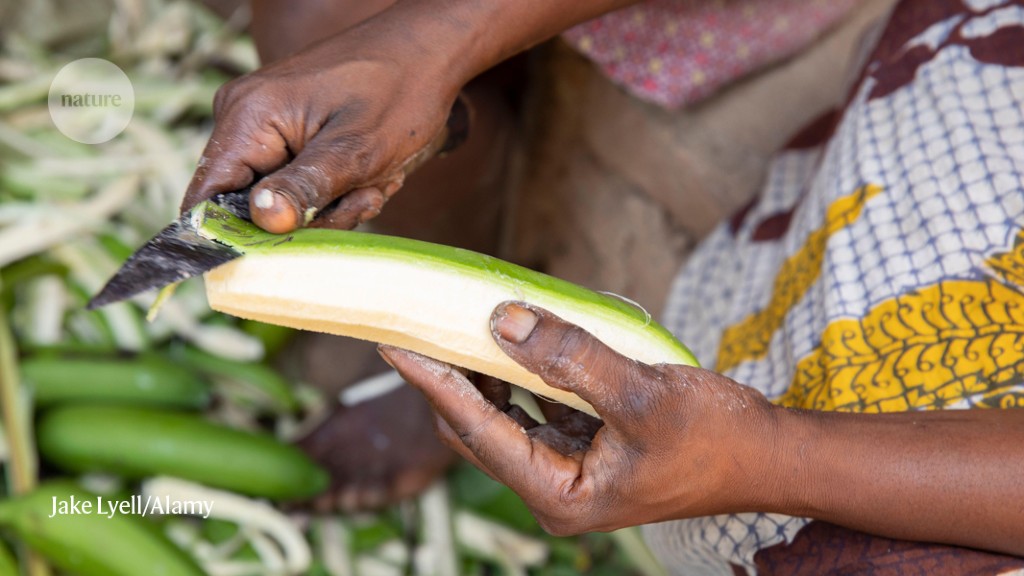Biotechnologist’s long-life bananas unite business and social solutions

George William Byarugaba Bazirake brings academic values to his company

Matooke cooking bananas are a staple food in Uganda. George William Byarugaba Bazirake’s company has found a way to give them a long shelf life.Credit: Jake Lyell/Alamy
George William Byarugaba Bazirake is a Ugandan food biotechnologist and the founder and managing director of Frevasema, a company in Mbarara that exports fresh, vacuum-sealed bananas to the United States and Australia.
He started his career teaching at Kyebambe Girls Secondary School in western Uganda in the mid-1980s. Beginning in 1990, he pursued a bachelor’s and then a master’s degree in food technology from Kuban State University in Krasnodar, Russia, graduating in 1995. In 2008, he earned a PhD in food biotechnology from a programme at Stellenbosch University in South Africa that allowed him to continue to work part-time as a lecturer at Kyambogo University (KYU) and to study at Makerere University, both in Kampala.
He served as dean of the faculty of science at KYU from 2012 to 2016, and retired in 2020 when he reached 60, the mandatory retirement age for public servants in Uganda. However, retirement has not slowed him down. He is now vice-chair of the board of the Uganda National Council for Science and Technology.
His company anchored a consortium of five other businesses owned by researchers and academics that formed Afri Banana Products in 2012, but eventually the partners split apart as they diversified their products. Frevasema now exports an average of 3 tonnes of cooking bananas — called matooke, and found only in East Africa — every month. It also manufactures wine from matooke. Bazirake tells Nature about his career, which has taught him how to straddle the worlds of academic research and product commercialization.
What should academics learn before they venture into business? And what academic knowledge has been important for you in business?
Let me start with the most difficult lesson: business is risky. Everyone is looking to benefit. Workers and consultants sometimes want to take advantage of you. Also, academics who want to start up businesses should start saving money and finding investors early, while they are still earning a salary. In that way, you create a soft landing. I am still investing the income I earn as a contract lecturer at KYU. Start saving for investment in your business early. If you wait until retirement, you will crash.
I brought from academia the idea of the importance of research to my business. Looking at business ideas that can solve societal problems, the ideas must also produce new products and services for society.
In our case, the bananas that are usually eaten fresh are bulky and perishable. A few days after cutting, the bunch will ripen and eventually spoil. But with technology, products such as matooke, the East African Highland banana, and its juices can stay fresh longer. We use biotechnological solutions such as enzymatic inactivation to stop spoilage and biotransformation by yeast to help to turn the juices into wine. Ordinarily, bananas spoil after five to eight days, but our bananas can last for up to six months with refrigeration and deep-freezing — that allows us to export to the African diaspora market around the globe.
What risks are involved in moving from academia to business?
You come in not understanding the business landscape. But also, there are more uncertainties. For example, you might invest in a hotel in a new area, and then competitors might come in and provide better services. You will have to either modify the hotel or agree to earn less because the newcomer is providing a better service. This means that you must stay innovative in business, focusing or diversifying products and services to have a competitive advantage.
What happened to Afri Banana?
Afri Banana was started by a team of six academics. It was a consortium of research experts from universities and the private sector, from Uganda and Kenya. The goal was to have an innovation hub where the community would also benefit from our expertise and knowledge transfer. But we lacked focus and unity. When some people started performing better than the others, they thought they would be better off working alone. The partners had different interests at the research and commercialization stages.
How difficult is it being an academic, entrepreneur and family man at once?
Planning is important in this. Marry a partner — not simply a spouse. My wife, who is also a professor and head of the literature department at KYU, has been a wife, businesswoman, partner and adviser to me. In the business, we share roles.
Our children are also partners. They do the laundry at home. They also help with simple tasks, such as computer work — entering sales and income statements.
The business is registered as not-for-profit, so we have a few development partners. And we seek to engage and empower communities, especially women and young people, through employment. But raising money has not been easy after the mess of the COVID-19 pandemic, so I am supplementing with my contract teaching at KYU, where I supervise master’s and PhD students in their thesis work. I also lecture and give guidance to assistant lecturers who are teaching undergraduates.
doi: https://doi.org/10.1038/d41586-023-02755-7
This interview has been edited for length and clarity.
This story originally appeared on: Nature - Author:Christopher Bendana


















